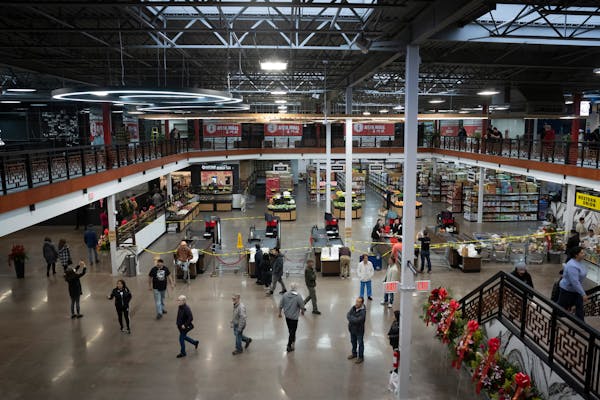Asian retail stores and restaurants are seeing a moment in the Twin Cities — at the same time that tariffs could significantly raise their costs.
Openings this month for the Japanese retail store Daiso in Crystal and Moona Moono store and cafe in Uptown drew crowds. Vacant storefronts across the Twin Cities have been filling up with Asian grocery stores, clawcades and shops filled with "trinkets."
The Asia Mall in Eden Prairie has been a hit, and one of the investors in that venture has paired with one of the principals of HmongTown Marketplace in St. Paul to build an Asian marketplace in Maplewood Mall.
Bruce Nustad, president of the Minnesota Retailers Association, and Bao Lee, small business training manager at the Asian Economic Development Association of Minnesota, both said their organizations are seeing growth in the sector.
Owners of longstanding Asian businesses say they have recovered from pandemic lows and are feeling the competition. They're also worried about losing customers if they have to raise prices because of tariffs.
Take United Noodles, a south Minneapolis staple that opened in 1972.
"Sales are up and back to and maybe a little above pre-pandemic levels," said general manager Kevin Aure.
The operation is considering converting a vacant space in its building into a flea market and event space. If that happens, the addition would join other stores popping up across the Twin Cities, Aure said.
The growth in new Asian food halls, mom-and-pop restaurants, markets and grocery stores is great, he said, but they are coming online as pricing pressures soar amid sudden tariffs.
President Donald Trump added 10% base tariffs on goods from many countries this month. But he raised levies on many Chinese goods to 145%. That's on top of some prior tariffs, meaning select Chinese products will cost some tiny businesses nearly 200% to import.
Aure and owner Eric Fung on Wednesday were creating an action plan, talking to vendors and deciding what would trigger price increases. They aren't there yet, Aure said. The two still hope the newest tariffs might go away.
"We don't keep a lot of inventory. I'd say maybe two weeks' worth. We didn't stockpile because [the tariffs] could change tomorrow, and then we would be sitting on a bunch of things," Aure said. "So the name of the game is just waiting. It could end tomorrow. We don't know. So you just have to be cautious and just play the cards right."
They know they might need to raise their grocery prices and hope it wouldn't turn away too many customers.
Basil Cafe Thai Cuisine in St. Paul has taken a different approach. Its storage area has become a maze as the St. Paul restaurant stocks up on anything it can.
"Business has been good," but sticky inflation has hurt over the past few years, said Nuz Sanidad, general manager of the family-owned restaurant that opened five years ago and became profitable last year.
Already, inflation has nearly doubled prices for some dishes, she said. The restaurant's costs for imported staples like soy and fish sauce and packaged snacks will go up again under the new tariffs. That means the owner will probably have to raise prices, Sanidad said.
Dragon Star Oriental Foods in St. Paul already has raised some prices. The last time mango-shaped creamsicles from China shot up in price was when they were all the rage on TikTok and demand skyrocketed. Last week, the price for a box of three leaped from $9 to $11.49.
"It's crazy," said Tong Vang, floor manager at Dragon Star.
Some items are being kept off the shelves this week until Dragon Star's owners can figure out their new costs and what prices should be on the truckloads that arrive nearly daily.
The co-owners of Kinoko Kids are trying not to sweat inflation and tariff details. Instead, they are concentrating on exciting business opportunities as demand for Asian goods soars.
"It feels like a waste of time and energy to try and suss those things out when everything is in flux," said Erika Olson Gross, who opened Kinoko Kids' Minneapolis store eight years ago with Tammy Tanaka Johnson. She admits it is challenging not to get worked up over the complications the tariffs may cause.
Much of Kinoko Kids' inventory focuses on Japanese imports. But it would be nearly impossible to avoid goods produced in China, Olson Gross said. For instance, most toys are made in China. One distributor is anticipating a 15% tariff surcharge.
Olson Gross is most concerned about the elimination of the "de minimis exemption." It allowed small orders to enter the country without being subject to tariff. Not anymore.
It's a worry "because we're really small and move through our inventory quickly, I'm constantly placing orders," Olson Gross said.
The tariffs are also creating financial barriers, forcing tough decisions on Tony Yang and Grace Huang — the owners of Legendary Spice, Boba X and Sweet Station.
"For us, sharing culture through food is not just a mission, it's the heart of everything we do," said Shawn Lin, director of marketing and operations.
They're exploring how to improve operational efficiencies and inventory turnover rates while testing alternative ingredients and finding new suppliers that can retain the flavor and authenticity of dishes as much as possible. Lin is figuring out if he should increase prices or reduce portion sizes.
Each option chips away at the experience their businesses are trying to preserve, Lin said. Many of their ingredients ship regularly from Taiwan or China.
Not being able to import "is a direct threat to the cultural storytelling we've built our brand upon," Lin said.
The tariffs could raise costs 15% to 20%, he said, "a significant disruption for any restaurant operating with narrow margins."
Another issue: Like any business, he likes to plan months ahead and make financial projections. That's impossible now, he said.
Lenny Haung's family is seeing a different side of the tariff dilemma.
The family opened Shuang Hur Supermarket in St. Paul 32 years ago and sells tens of thousands of food items to a predominantly Asian customer base from eight different nations.
Business is brisk. But that's because families and nearby restaurant owners are so worried the tariffs, especially on Chinese goods, will jack up prices, they are doubling up on purchases, Haung said.
"Everyone already bought all the rice," he said. "Certain popular brands have sold out. One we got last week on Saturday sold out by Saturday night."
Because the business still has a full warehouse, the tariffs have not affected the grocery yet, he said.
"But a lot of vendors are telling us prices will go up," Haung said, adding that the store froze hiring and is looking for other ways to curb expenses.
The family will hold off on tariff-driven price hikes for as long as possible to help loyal customers and the growing number of small Asian businesses it supports.
Two years ago, Shuang Hur doubled down on offerings from local Asian firms. Today it sells strawberry cake from Akiko's in Minneapolis; teas from Basil Cafe and Tii Cup in West St. Paul and taro-salted yolk buns from Sweet Percent bakery in Maplewood.
Haung hopes the tariffs won't harm all these little businesses that have done well up until now.
Across town, Ben Hamd, founder of Maplewood Mall owner Brookwood Capital Advisors, said a temporary agreement has been reached to build the Pan Asian Center in the former Macy's space.
The Macy's in the Maplewood Mall was sold in a joint venture on March 21 to a team that included Marshall Nguyen. Nguyen played a major role developing Asia Mall in Eden Prairie. He is also leading the revitalization of Burnsville Center. Another player in bringing the Pan Asian Center to life is HmongTown Marketplace owner Toua Xiong, who also owns the former Sears space in the mall.
While Hamd said he considers the store opening in May to be a "pop-up shop," Xiong said his group plans to extensively build out the spaces.
Nustad, of the retail association, said either reality proves Asian businesses are hot across the metro area.
"I think the Minnesota consumer is really enjoying their opportunity to experience a different culture in some of these new marketplaces and malls," Nustad said.

Luxe Bloomington home with multilevel pool and theater lists at $3.29M

From lakeside getaways to urban oases, here are the 2025-26 Home of the Month winners
Rural Minnesota doctors find patients open to off-site gun storage as suicide prevention

